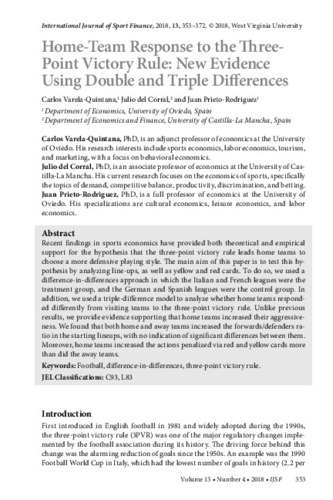Home-team response to the three-point victory rule: New evidence using double and triple differences
Publication date:
Citación:
Descripción física:
Abstract:
Recent findings in sports economics have provided both theoretical and empirical support for the hypothesis that the three-point victory rule leads home teams to choose a more defensive playing style. The main aim of this paper is to test this hypothesis by analyzing line-ups, as well as yellow and red cards. To do so, we used a difference-in-differences approach in which the Italian and French leagues were the treatment group, and the German and Spanish leagues were the control group. In addition, we used a triple-difference model to analyze whether home teams responded differently from visiting teams to the three-point victory rule. Unlike previous results, we provide evidence supporting that home teams increased their aggressiveness. We found that both home and away teams increased the forwards/defenders ratio in the starting lineups, with no indication of significant differences between them. Moreover, home teams increased the actions penalized via red and yellow cards more than did the away teams.
Recent findings in sports economics have provided both theoretical and empirical support for the hypothesis that the three-point victory rule leads home teams to choose a more defensive playing style. The main aim of this paper is to test this hypothesis by analyzing line-ups, as well as yellow and red cards. To do so, we used a difference-in-differences approach in which the Italian and French leagues were the treatment group, and the German and Spanish leagues were the control group. In addition, we used a triple-difference model to analyze whether home teams responded differently from visiting teams to the three-point victory rule. Unlike previous results, we provide evidence supporting that home teams increased their aggressiveness. We found that both home and away teams increased the forwards/defenders ratio in the starting lineups, with no indication of significant differences between them. Moreover, home teams increased the actions penalized via red and yellow cards more than did the away teams.
ISSN:
Files in this item




